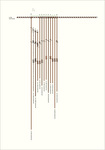| Statistics: |
Original Author: Marcia & Robert Ascher
Museum: American Museum of Natural History, New York, NY, USA
Museum Number: 41.2/6701
Provenance: Unknown
Region: Ica
|
# of Cords: 13 (10p 3s)
# of Unique Cord Colors: 5
Benford Match: 0.8473
# Ascher Sums (pps, ips, cps, sps,...): 2 (0, 0, 0, 2,...)
Similar Khipu: Previous (UR161) Next (UR223)>
|
|
| Notes: |
Ascher Databook Notes:
- AS190-AS197 were purchased by the Museum in 1969 from Louis Slavitz. Their provenance is near Callengo, lea Valley. They are compared following AS191.
- Pendant 1 is a sum cord for the group since the value on it and on its 3 subsidiaries all can be obtained by summing other pendant values in the group.
- An unusual number of perfect squares are values on the cords:
P1 s1 = 49 = 72
P1 s3 = 64 = 82
P3 = 16 = 42
P10 = 36 = 62
- In keeping with observations 2 and 3, additional perfect squares can be found by summing cord values. The number of them and their patterned appearance seem to be more than chance.
- Separating the 9 pendants (P2-P10) into subgroups of 1, 3, 1, 3, 1 pendants each and calling them:
Yi i=(1,...,5) (i. e., Y1 = P2; Y2 = P3 + P4 + P5; Y3 = P6; Y4 = P7 + P8 + P9; Y5 =P 10)
The following hold:
-
Y1 + Y3 + Y5 = 92
Y2 + Y4 = 82
-
Y4 = 52
Y5 = 62
Y2 + Y3 = 72
Y2 + Y4 = 82
Y2 + Y4 + Y5 = 102
-
- The values on P1 and its subsidiaries can also be expressed in terms of these subgroups:
P1 = Y2 + Y3 + Y4 + Y5
P1 s1 = Y2 + Y3
P1 s2 = Y2
P1 s3 = Y2 + Y4
- An alternate separation into subgroups of 3, 1, 1, 1, 3 pendants such that:
Y1=P2+P3+P4
Y2=P5
Y3=P6
Y4=P7
Y5=P8+P9+P10
gives:
Y1+Y3+Y5=112
- Finally, the sum cord P1 and its subsidiaries can be viewed in terms of squares.
P1 =52 + 62 + 72
P1 s3 =82
P1 - P1 s1 =52 + 62
P1 s3-P1 s2 = 52
or
P1 - P1 s1 + P1 s2 = 62 + 82 =102
P1 s3 - P1 s2 + P1 s1 = 52 + 72
P1 - P1 s1+P1 s2 - P1 s3 = 62
-(P1 s3 - P1 s2 + P1 s1) + P1 = 62
|



